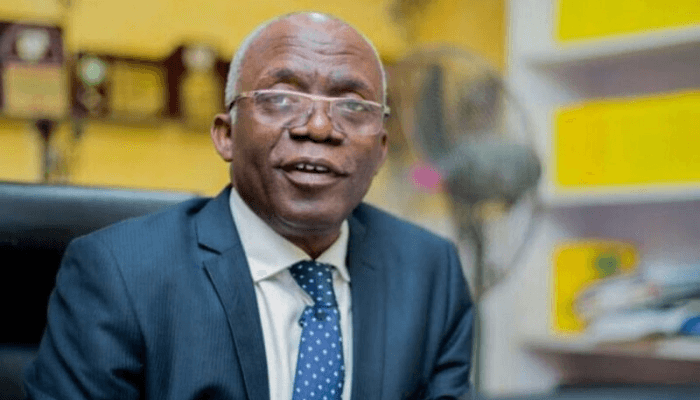The Legal Implications of Continued Colonialism in the World by the West

Femi Falana, SAN
The members of the Society for International Relations Awareness (SIRA) deserve commendation for promoting international solidarity with colonised people in Africa and other parts of the world. I wish to congratulate the SIRA and the Nigerian Movement for the Liberation of Western Sahara as well as other progressive organisations and individuals for the successful campaign that frustrated the the plan of the Kingdom of Morocco to become a member state of the Economic Community of West African States (ECOWAS).
I am delighted to note that the representatives of the
majority of the 17 territories under colonial subjugation are participating in this international conference to end foreign domination in the world. It is hoped that this conference will energise and strengthen the capacity of liberation movements to defeat the forces of foreign domination and their allies in Europe and the United States.
COLONISED COUNTRIES AND COLONISED COUNTRIES
The 17 countries that are under colonial rule are called non self-governing territories by the United Nations. The colonised territories include Western Sahara, Anguilla, Bermuda, British Virgin Islands, Cayman Island, Falkland Islands, Montserrat, Saint Helena, Turks and Caicos Islands, United States Virgin Islands, Gibraltar, American Samoa, French Polynesia, Guam, New Caledonia, Pitcairn, and Tokelau. The colonial powers are the United Kingdom, United States, France and New Zealand.
Apart from the ruthless exploitation of the occupied territories, the colonial powers have converted some of them to haven for promoting money laundering, tax evasion and for keeping looted wealth. They are used as holiday resorts and casino centres by members of the bourgeoisie from the United States, Europe and neocolonial countries. Owing to lack of media coverage, all manners of criminal activities are perpetrated by the colonial officials and their home governments.
Last May, a United Nations forum on decolonization, which took place in Bali, Indonesia, declared that top priority must be given to overcoming the many challenges facing the world’s 17 remaining Non Self-governing territories “to avoid undoing much of the progress achieved towards sustainable development and self-determination.” In a video message, the Secretary-General of the United Nations, António Guterres urged a focus on “the aspirations and needs of the Territories on a case-by-case basis”—including innovative steps to “ensure the Territories have the resources and support they need to advance the Sustainable Development Goals (SDGs), build resilience, and invest in their future”.
Mr. Guterres also said that “New pathways for stronger cooperation between the Territories, administering Powers and key stakeholders” are needed to turn the tide on the many challenges the Territories are facing, the Secretary-General said, including “small islands on the frontlines of the climate emergency.” With respect, there can be no meaningful cooperation between the colonised territories and the colonial powers. The UN should therefore support the struggle of the people of the 17 colonised territories for independence.
ILLEGAL AGREEMENTS BETWEEN MOROCCO AND EUROPEAN UNION ON RESOURCES OF WESTERN SAHARA
The struggle for the independence of the colonised countries cannot be won without international solidarity and collaboration. Permit me to speak on the decolonisation program of the Saharawi Arab Democratic Republic because of the progress recorded in the legal front. Apart from launching a sustained diplomatic campaign against the occupation of part of her territory by the Kingdom of Morocco, the SADR has embarked on a major legal offensive which has compelled international courts to recognise and uphold the right to self-determination of the people of Western Sahara.
On 29 September 2021, the General Court of the European Union ruled on the following three cases:
Case T-279/19, brought on 27 April 2019, seeking the annulment of Council Decision 2019/217 of 28 January 2019 on concluding the amendments to the Protocols to the Euro-Mediterranean Agreement establishing an association between the European Communities and their Member States, of the one part, and the Kingdom of Morocco, on the other part.
Case T-344/19, brought on 10 June 2019, seeking the annulment of Council Decision 2019/441 of 4 March 2019 on the conclusion of the EU-Morocco Sustainable Fisheries Partnership Agreement, the Implementation Protocol thereto and the Exchange of Letters accompanying the Agreement.
Case T-356/19, brought on 12 June 2019, seeking the annulment of Council Regulation 2019/440 of 29 November 2018, allocating the fishing opportunities under the newly concluded Sustainable Fisheries Partnership Agreement and Protocol.
It has been said that “The rulings clarified the Front Polisario’s legal personality as the internationally recognised representative of the people of Western Sahara and again confirmed that Western Sahara has a status that is separate and distinct from Morocco and, as such, should be regarded as a third party to any EU-Morocco agreement. Extending the territorial scope of any such agreement to the territory necessarily requires the consent of the people of Western Sahara through their representation, the Court repeated – adding that the consultations of the local population carried out by the EU institutions did not meet that requisite. The Court has essentially held the same line of reasoning as in 2016 and in 2018”.
RIGHT OF PEOPLE OF WESTERN SAHARA UPHELD BY AFRICAN COURT ON HUMAN AND PEOPLES RIGHTS
On September 22, 2022, the African Court on Human and Peoples’ Rights, delivered a landmark judgment in the case of Bernard Mornah v. Republic of Benin and 7 Others (Application No 028/2018). The Applicant is a national of the Republic of Ghana. The case was filed on the Applicant’s behalf by our law firm against eight (8) State Parties to the Protocol for the Establishment of the African Court on Human and Peoples Rights namely the Republic of Benin, Burkina Faso, Republic of Cote d’Ivoire, Republic of Ghana, Republic of Mali, Republic of Malawi, Republic of Tanzania, Republic of Tunisia. We sued the 8 Respondent States because they had made the Declaration which enables NGOs and individuals to access the Court in accordance with article 34(6) of the Protocol for the Establishment of the African Court.
The Applicant had sought to have the Court hold the 8 States to have abdicated their International Obligations as envisioned in the African Charter on Human and peoples’ Rights and the Constitutive Act of the A.U. by admitting Morocco to the AU. The Applicant’s argument was that the states allow the African Union to admit Morocco without any conditions requesting it to end its occupation of the SADR’s territory and thus the 8 States had failed to safeguard the sovereignty, independence, and territorial integrity of the Sahrawi Arab Democratic Republic (SADR).
The African Court on Human and Peoples’ Rights delivered a judgment concluding that Morocco’s occupation of Western Sahara is a violation of the right to self-determination and independence, and that all States have an obligation to assist the people of Western Sahara in their struggle for self-determination.
Focusing specifically on the violation of the Saharawi people’s right to self-determination, the Court noted that several other autonomous human rights were violated by Morocco in Western Sahara, including the right to dispose of natural resources, but “observed that their violation basically flows from the alleged denial of the right to self-determination of the people of Western Sahara.”
Against that background, it concluded that “the continued occupation of the SADR by Morocco is incompatible with the right to self-determination of the people of SADR”, and that while the eight charged States did not themselves directly violate the rights of the Saharawi people, they do have an obligation to assist the people of Western Sahara in their struggle for self-determination. The Court further ruled that “The Respondent States, and indeed, all State parties to the Charter and the Protocol, as well as all Member States of the AU, have the responsibility under international law, to find a permanent solution to the occupation and to ensure the enjoyment of the inalienable right to self-determination of the Sahrawi people and not to do anything that would give recognition to such occupation as lawful or impede their enjoyment of this right”.
Thus, in upholding the human right of the people of Western Sahara to self-determination, the African Court on Human and Peoples Rights echoes the International Court of Justice and the Court of Justice of the European Union. The combined effect of these rulings is that the occupation of part of the territory of Western Sahara by Morocco cannot be justified under international law. In other words, the Kingdom of Morocco is not competent to exploit any of the vast natural resources in Western Sahara as they belong to the Saharawi people.
In utter violation of the ruling of the African Court, not less than 15 member states of the African Union have established consulates in a section of the occupied territory of Western Sahara allocated to them by Morocco. Our law firm will soon apply to the African Court to order the closure of the consulates since all member states of the African Union are under a legal obligation to comply with the judgment of the Court in the case of Bernard Mornah v. Republic of Benin and 7 Others (supra).
Permit me to conclude my intervention in this conference with the following recommendations:
The Conference should acknowledge the unflinching support of Cuba to the struggle of all colonised peoples in the World. The Conference should call on the United States to end the sanctions imposed on Cuba for over 60 years.
The colonisers of the 17 occupied territories should be named, exposed and shamed in the media.
The diplomatic, political and legal initiatives of the SADR should be adopted by other colonised territories. In particular, the colonised territories should approach international courts and tribunals to enforce their human right to self-determination.
Domestic courts in all African States should be mobilised to stop the importation of fish, phosphate and other products from Western Sahara without the consent and authority of the Polisario Front.
The gas pipeline between Nigeria and Morocco must not be permitted to pass through the territory of Western Sahara without the consent and authority of the Polisario Front.
Morocco has influenced 15 African member states to establish consulates in Western Sahara. The countries should be exposed and challenged with a view to closing down the consulates.
SADR should make a Declaration to enable the people of Western Sahara to access the African Court on Human and Peoples Rights in line with article 34(6) of the Protocol for the Establishment of the African Court.
Progressive forces in Africa should mount pressure on the African Union to comply with the judgment of the African Court by adopting measures to end the illegal occupation of the territory of Western Sahara by Morocco.
*Being the paper presented by Femi Falana SAN at the International Conference to end Colonialism in the World held by the Society for International Relations Awareness (SIRA) from August 12-13, 2024 at Abuja, Nigeria



